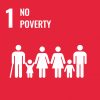Nghia Dan, Nghe An Province, 28 November 2022 – The vistas of rice paddy fields surrounding Nghia Dan, Viet Nam paint a picture of quiet calm. The landscape does not reveal how the COVID-19 pandemic has brought a wave of returnees who struggle to reintegrate into one of the poorest provinces of the country.
Nguyen Thi Nhan is one of them. She returned home in November 2021, after working for a year in Macao Special Administrative Region (SAR), China as a domestic helper. In 2018, she became the sole breadwinner after her husband was injured in a car accident.
She met with a broker with the hope of finding a high-paying job in Macao SAR, China. The broker charged her nearly USD 2,000 in recruitment fees and other costs to land a job. For Nhan, this was more than a full year’s income – Viet Nam’s minimum wage is less than USD 170 per month.
The 56-year-old borrowed money from her relatives to secure a job. She dreamed of making enough money to pay off the debt and supporting her family.
“My employer in Macao SAR, China treated me nicely and I was able to send some of my monthly income back home. But then, COVID-19 changed everything. I lost my job because the family I worked for could not return to Macao SAR, China due to its border closure,” Nhan recalled.
Stranded without a job or any means to return home, Nhan was forced to rely on food relief provided by local organizations. She stayed in a dormitory packed with other unemployed migrant workers for months, before making her way home.
Nhan’s story is replicated by many other migrant worker returnees in Nghia Dan province whose livelihoods have been impacted by COVID-19. Since the start of the pandemic, the province has seen 13,800 migrant workers return from overseas due to job loss, restrictions of movement, lack of access to health care, protracted isolation and limited employment opportunities in their communities of origin.

Returnee Nguyen Thi Nhan (left) has received IOM cash assistance, medical support, and training. Photo: IOM Viet Nam
IOM has been providing emergency assistance packages which include multi-purpose cash assistance, health assessment, and soft skills training for reintegration and safe migration.
Another local, 40-year-old Truong Van Thai, returned to Nghia Dan in September 2021 after working for a year in Lao People’s Democratic Republic. With two young daughters to support, he was alerted about a construction job in the neighboring country by his brother-in-law who had been working there as an irregular migrant worker for years. For Thai, the allure of a higher pay job outweighed the risks involved when accepting the offer.

Truong Van Thai, an international migrant worker returnee, and his daughter registering their information. Photo: IOM Viet Nam
The construction job was demanding but Thai did not complain because he was making enough money to send home. He recalls how he and other workers were asked to hide in the nearby jungle whenever local police patrolled construction areas in search of irregular migrant workers.
When COVID-19 peaked and construction worksites were closed, Thai found himself on a bus heading back home with his last month of salary.
Thai was among 130 international migrant returnees from vulnerable groups who were selected for IOM’s emergency support. Those belonging to this category include returnees who are ill and need medical care, others are sole breadwinners with children or elderly parents to support; while some suffered tremendously during the pandemic and upon their return.
Irregular migrant workers are not counted in national statistics on international labour migration and, therefore, often excluded from government programmes.
“Being the family’s sole breadwinner, I just can’t afford to get sick,” Thai said slowly while gently rubbing his daughter’s head. “When my youngest daughter is a bit older, I may consider going back to Lao People’s Democratic Republic for work. There will be more expenses in the future when my children get older and my current income is just not enough,” he added.

International migrant worker returnees reading information on safe migration during IOM training. Photo: IOM Viet Nam
When asked about their priorities for the future, Nhan and Thai expressed different approaches.
“I hope to soon find a job near home before thinking of working overseas again”, Nhan said. “The experience of being stranded in a foreign country during the COVID-19 lockdown was not easy for me.”
For Thai, the prospect of higher income still motivates him to look for a new job overseas but with the benefit of experience, his considerations will be different. “I have reflected on my labour migration journey and realized it involved many risks,” Thai said. “I have my daughters to take care of,” he added, “So, safety will be my top priority if I work overseas again.”

An international migrant worker who returned to Nghia Dan writes her reintegration plan when attending IOM’s training on sustainable reintegration and safe migration. Photo: IOM Viet Nam
Names have been changed to protect the identities of migrant workers.
Text by Nguyen Thi Hong Yen, Communications Coordinator, IOM’s Corporate Responsibility in Eliminating Slavery and Trafficking (CREST).



